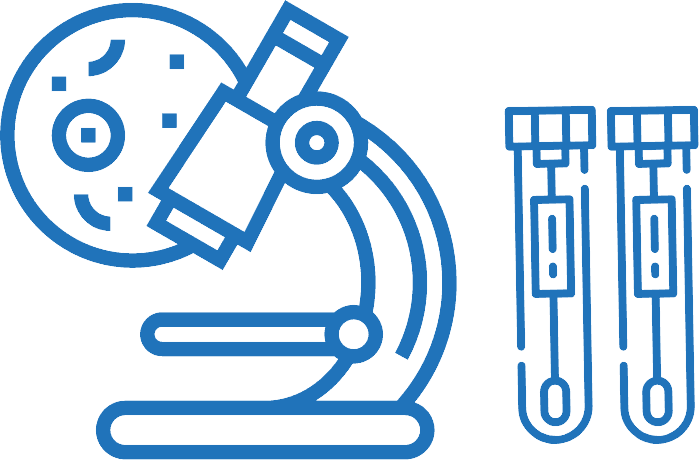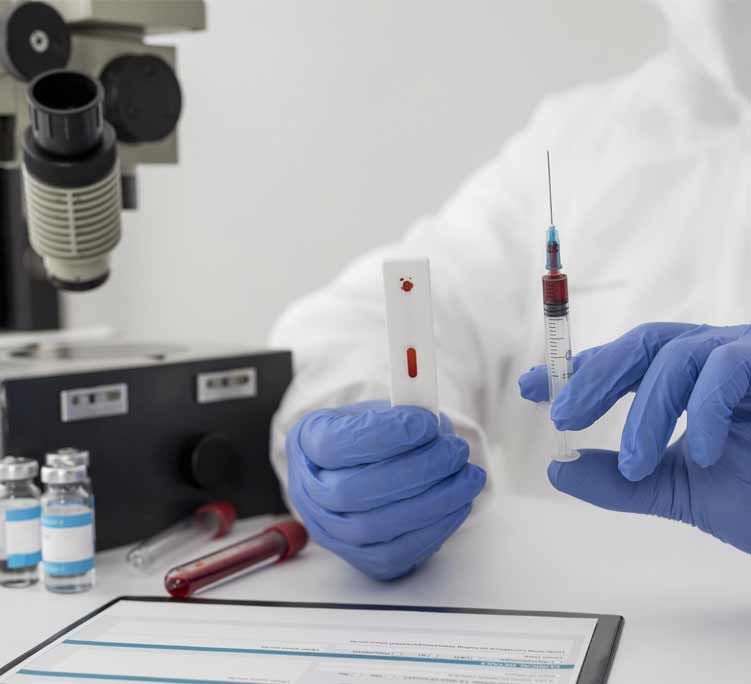Are you on top of your sexual health?
Stress free, affordable and fast STI tests.
Get tested, be sure, and be confident.
STI tests without the hassle
Request forms, blood tests, followup appointments: no one enjoys the back and forth of getting a blood test.
Now, with InstantScripts, you can simplify the process by taking it online.
Fill out a digital consultation and, if you’re eligible, we’ll send you a pathology request form in just minutes.
InstantScripts should receive your results within three to seven working days.
Once we’ve received your pathology test results, we will notify you by email, either with the results themselves or to organise a follow up if clinically indicated.
If you need to discuss your results, you can organise a telehealth consultation to speak with one of our doctors or visit your regular GP. We can help organise access to your results to take to your regular GP.

The importance of STI testing
Many people can suffer from a Sexually Transmitted Infection (STI) without even knowing it. An untreated STI not only poses a risk to your own health, but to the health of any sexual partners you may have. STIs can lead to more serious health problems, and can even leave you vulnerable to other conditions, such as HIV.
The CDC recommends that all sexually active people get a full sexual health screening at least once a year. But if you think you may have contracted an STI, you can’t afford to wait.
Online blood tests: It’s as easy as 1, 2, 3!
STEP 1
Complete a digital consultation form. If approved by one of our doctors, a pathology form will be sent to you via phone or email.
STEP 2
STEP 3
Get a pathology request form in just minutes
InstantScripts is making it as quick, easy and efficient as possible to get your pathology request form online. Simply fill out our digital consultation and select the blood tests you need:
Chlamydia & Gonorrhea
Syphilis
Hepatitis B and C
HIV
Here’s how it works:
How to recognise the signs of an STI
Sometimes you can have an STI without even realising it, so it’s important to be able to recognise the signs. Remember, not everyone will exhibit symptoms after contracting an STI, so if you’re worried, it’s always best to consult a doctor.
Chlamydia is the most commonly reported STI. People who have contracted the infection often exhibit no early symptoms, or their symptoms are so mild that they go unnoticed. This is why Chlamydia is often referred to as a ‘silent’ infection, and why doctors recommend an annual screening.
Symptoms of Chlamydia in women include:
- Pain during sexual intercourse
- Vaginal discharge
- A burning sensation during urination
- Pain in the lower abdomen
- Inflammation of the cervix
- Spotting between periods
Symptoms of Chlamydia in men include:
- A burning sensation during urination
- Discharge from the penis (yellow or green)
- Pain in the lower abdomen
- Pain in the testicles
Gonorrhea is caused by the bacterium Neisseria gonorrhoeae, and often targets warm, moist areas of the body, such as the urethra, eyes, throat, vagina, anus or the female reproductive tract.
Symptoms of Gonorrhea in women:
- Watery, creamy or slightly green discharge from the vagina
- Pain or burning while urinating and the urge to urinate more frequently
- Spotting or heavier than average periods
- A sore throat
- Pain during sexual intercourse
- A sharp pain in the lower abdomen
- Fever
Symptoms of Gonorrhea in men:
- A more frequent and urgent need to urinate
- A pus-like discharge from the penis. This can be white, yellow, beige or slightly green
- Swelling or redness at the opening of the penis
- Swelling or pain in the testicles
- A persistently sore throat
The early symptoms of Syphilis can be easily missed and can even go years without being diagnosed. Syphilis is usually divided into four main stages:
Primary stage: Usually occurring about three to four weeks after contracting the bacteria, the first sign is usually a small, round sore known as a chancre. Highly contagious but usually painless, the sore may appear wherever the bacteria entered the body, including the mouth, genitals or rectum.
Secondary stage: During the second stage of Syphilis, you may develop skin rashes or a sore throat. While the rash usually appears on the palms or soles of the feet, it may be found anywhere on the body.
Other symptoms can include:
- Headaches
- Swollen lymph nodes
- Fatigue
- Aching joints
- Fever
- Weight loss
- Hair loss
Latent Stage: At this stage, the primary and secondary symptoms will vanish and there will be no other evident symptoms. Don’t be fooled by this stage, the bacteria will still be in your body.
Tertiary stage: This is the final stage of Syphilis, which can occur years or even decades after the initial infection. Tertiary Syphilis can be life-threatening, and may cause any of the following outcomes:
- Blindness
- Deafness
- Mental illness
- Memory loss
- Soft tissue and bone damage
- Neurological disorders, including stroke or meningitis
- Heart disease
- Neurosyphilis—an infection of the brain or spinal cord
Hepatitis B is spread via the bodily fluids of infected people. The condition affects the liver. Impacting people of all ages, the symptoms of Hepatitis B include:
- Loss of appetite
- Fatigue
- Nausea and vomiting
- Rashes
- Pain in the right side of the stomach
- Fever
- Sore joints
- Jaundice (yellow skin and eyes)
Hepatitis C is a viral infection that causes liver inflammation. It more commonly occurs through contact with infected blood, but can also be contracted through sexual intercourse.
There are two types of Hepatitis C: acute Hepatitis C and Chronic Hepatitis C. Chronic Hepatitis C is often considered a ‘silent’ infection, and won’t cause symptoms until enough damage has been done to the liver.
Acute Hepatitis C lasts six months or less. Symptoms include:
- Fever
- Exhaustion
- Loss of appetite
- Nausea or vomiting
- Stomach pain
- Joint or muscle pain
- Abnormalities in urine or bowel movements
- Yellowing of eyes or skin
Causing damage to the immune system, HIV reduces your body’s ability to fight off illness, and is transmitted through bodily fluid such as blood, semen, vaginal and rectal fluids and breast milk. Left untreated, HIV is likely to result in AIDS.
Symptoms of HIV can vary from mild to severe, may come and go, and can often be mistaken for flu symptoms. Signs to look out for include:
- Fever
- Chills
- Swollen lymph nodes
- General aches and pains
- Skin rash
- Sore throat
- Headache
- Nausea
- Upset stomach
Be proactive, get tested
STI symptoms can vary widely, often showing no signs at all, or being mistaken for less serious conditions such as a cold. That’s why it’s vital that you get tested annually to protect yourself and prevent the spread of these infections.
If you suspect that you may have contracted an STI, it’s important that you act fast and request a blood test today.

Frequently Asked Questions
Yes. InstantScripts’ pathology request forms are written by real, Australian-registered doctors and will be accepted at any clinic.
There’s a $20 fee associated with obtaining a pathology request with InstantScripts.
Once we’ve received the results of your blood test, we will contact you by email either with the results, or to organise a follow-up consultation with a doctor if needed.
You’ll typically hear back from us within 3-5 business days.
All consultations and data are kept 100% confidential.
Patient personal information is stored in secure cloud storage and encrypted in the database. All data is stored in Australian data centres.
Want to know more?
Check out our FAQ page for more information
© InstantScripts
Level 19, 644 Chapel Street,
South Yarra VIC 3141

